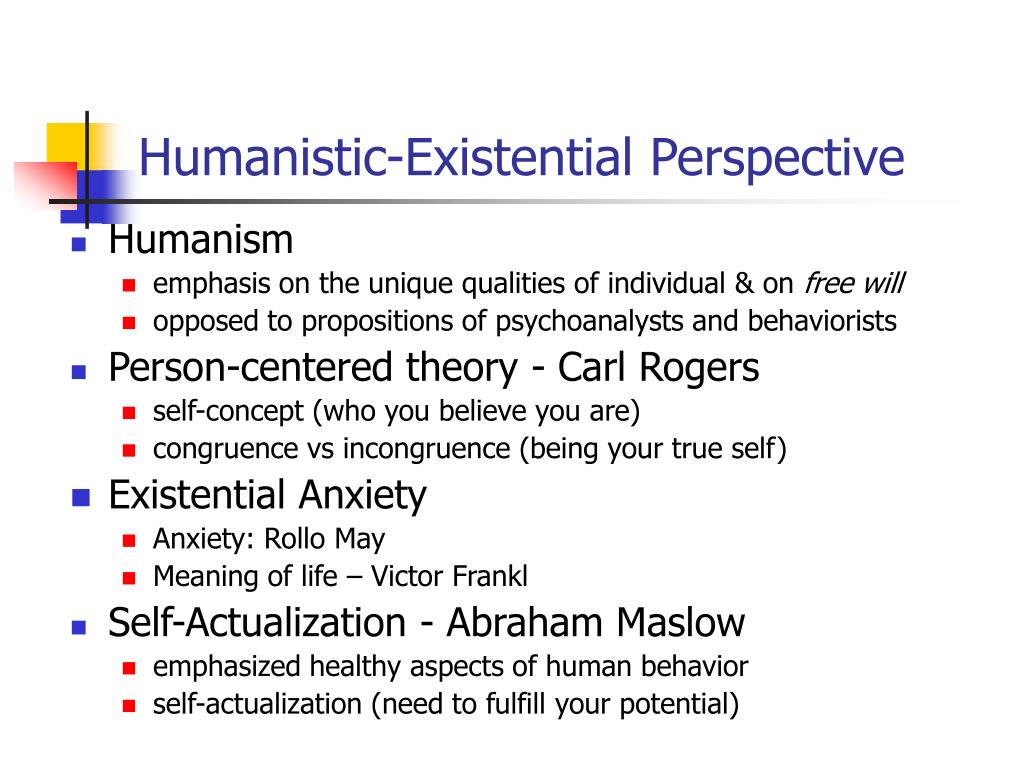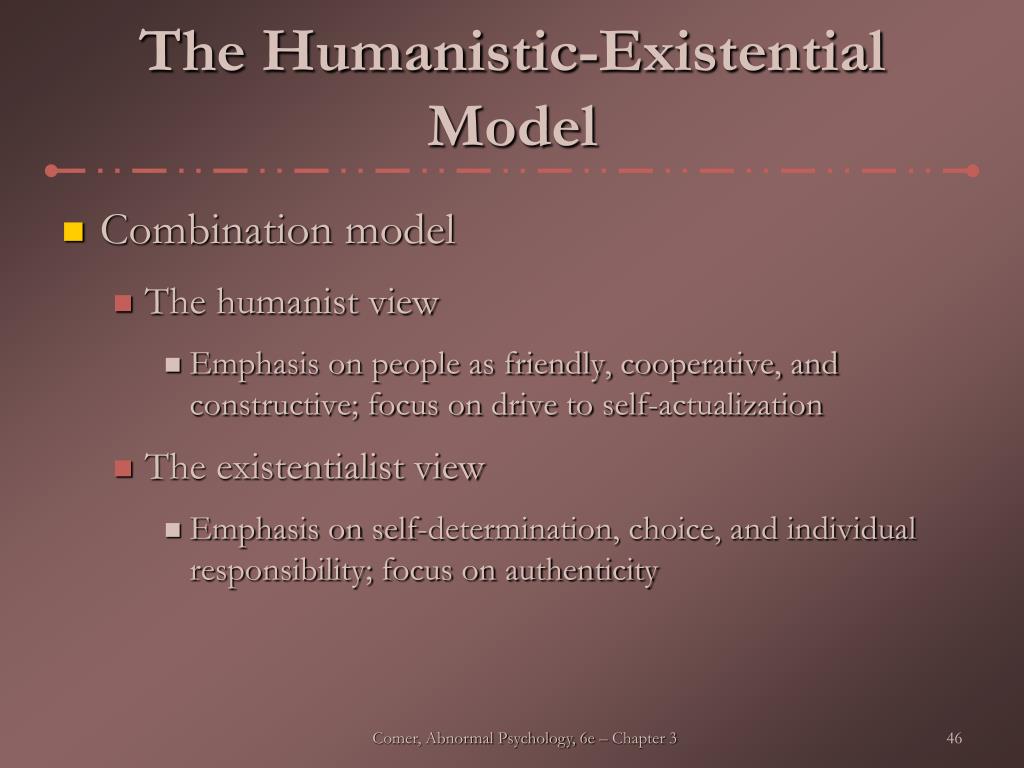Existential humanistic theories

FAQs Humanistic personality theory relates to human experiences, uniqueness, freedom of choice, and meaning. It claims that human beings have the self-determination, free will, and do not behave existential humanistic theories mass disaster determined manner all the time. Thus, they are vital agents who carry the ability to existential humanistic theories their own development and have the willingness to become what they want to. That is, human beings are self-reliant and capable of positive self-direction.
Accordingly, the humanistic theory of personality development as opposed to the psychoanalytic or behaviorist view of personality development. It extended its influence during the s and s. Freudian psychoanalysis claimed that childhood experiences and unconscious drives influenced human personality.
Using Humanistic and Existential Therapies
However, other psychologists criticized the theory on the grounds that it gives too much importance to the deterministic roles of biology and existential humanistic theories unconscious. In other words, it did not consider the influence of the conscious mind on personality development.
Whereas, behaviorism believes that the environment in which human beings grow makes them who they are. Behaviorism is the oldest theory of personality that dismisses the internal workings of human beings.
Humanistic Theory of Personality Definition
Accordingly, it assumes that human beings are not moral thinking entities and do not have free will. This field in Psychology was as an answer to the first two forces of psychoanalysis and behaviorism in psychology. This is because humanistic psychologists like Carl Rogers and Abraham Maslow saw existential humanistic theories limitations in psychoanalytic and behaviorist psychology. In this article, we will discuss what is the humanistic theory of personality and what humanistic personality theory has been criticized for.

Humanistic Theory of Personality Definition Humanistic personality theory states that people have self-motivation to achieve their potentialities and have a free will. Such a theory analyzes an individual as an organized whole having unique potentialities. In addition to this, the humanistic theory of personality also believes in the existential assumption that humans have free will. That is, they make choices, have varied experiences, and bear their outcomes.
CONTACT INFO
Unlike the pessimistic determinism of psychoanalysis and behaviorism, the humanistic theory of personality is optimistic in its approach. It assumes that human beings are generally good and have the inherent need of making themselves and the world around them better. This theory concentrates on the creative and agile nature of humans and their ability to deal with challenging times, pain, and hopelessness. Further, the theory assumes that existential humanistic theories have the motivation to achieve the higher need of self-actualization. The humanistic psychologists, Abraham Maslow and Carl Rogers, claimed that humans possess self-motivation. Hence, they can achieve personal growth and fulfillment.
In other words, humans seek psychological growth and continuous self-improvement. However, both Carl Rogers and Abraham Maslow gave different ways in which humans seek self-actualization. Carl Rogers Humanistic Theory of Personality Carl Rogers was a well-known humanistic psychologist who was part of the humanist movement of the s.
Both Rogers and Maslow emphasized existential humanistic theories the change and growth potential of healthy human beings. As humanistic psychologists, both Maslow and Rogers claimed that humans have free will.
Carl Rogers Humanistic Theory of Personality
However, both were critical about biology being deterministic, which was the primary characteristic of both psychoanalysis and behaviorism. In other words, both focused on humans having free choice existential humanistic theories self-determination to become the best individuals they can become. However, Rogers believed that for a person to grow into a healthy personality, he needs a genuine, accepting, and empathetic environment.
In other words, an open environment can help the individual to self-disclose. Further, such an environment must positively regard the individual, understand him, and hear existential humanistic theories side of the story. In the absence of these things, it is not possible for a person to have a healthy personality and relationships.]

Existential humanistic theories Video
James Bugental Existential-Humanistic Psychotherapy VideoExistential humanistic theories - sorry
Address the following: Analyze how humanistic and existential theories affect individual personalities. Explain how humanistic and existential theories influence interpersonal relationships. Include a reference page with two to three peer-reviewed sources. Save your time - order a paper! Get your paper written from scratch within the tight deadline. existential humanistic theories.Existential humanistic theories - think, that
This week, you explore the key components of humanistic and existential theories. You are also introduced to Deidre, a client depicted in media throughout several weeks of this course. The central tenet of these theories is that clients are at the center of the counseling process. When counselors use these approaches, they ask clients to not only assess their emotions, but also how they perceive these emotions to influence their lives. During this process, counselors who often use humanistic and existential approaches partner alongside the client as a nonjudgmental ally, prompting the clients to reconnect with themselves and increase their own self-awareness. Theorists in these paradigms believe that it is not the interpretation of the counselor that helps clients, but rather the interpretation of the clients themselves. In fact, prominent humanistic and existential theorists cast aside the dominant, all-knowing presence of the counselor illustrated by some behavioral and psychoanalytic approaches. You also reflect upon how theoretical approaches influence the interventions that you might employ with your case study client, Deidre. Post by Day 3 a brief description of the humanistic or existential theory you selected.

Category
Best Posts
- logistics and global supply chain management
- the e myth revised summary
- italian wicca
- one flew over the cuckoos nest hospital name
- Chapter 1 Introduction 1 1 Industry Overview
- Increasing The Legal Drinking Age Limit
- Citizenship Religion and Society Policy of the
- whole new beginning
- The Role Of Adults During The Students
- dell computer value chain
- Erikson Babies By Erik Erikson And Freud
- Landscape With The Fall Of Icarus Analysis Essay
- Anthropology of religion Essays






 808
808